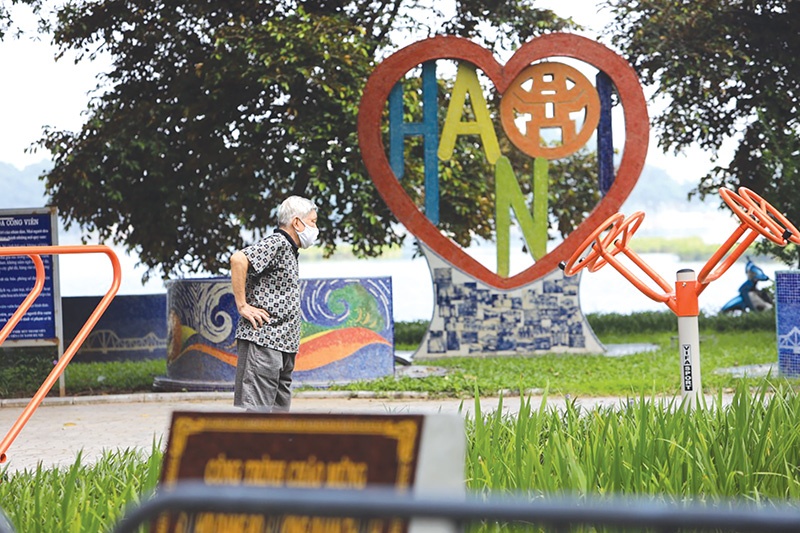Hanoi’s business households suffer flip-flop rulings
 |
| Hanoi’s business households suffer flip-flop rulings |
Every Friday, many such households in Hanoi have been in a state of insecurity as they actively prepare business plans before the city issues any new announcements regarding social restrictions. This situation has persisted for several weeks since Hanoi started to lead the country in the number of COVID-19 cases.
Nguyen Thi Lam, owner of a coffee shop in central Dong Da district, shared that the business has been interrupted continuously, making her feel anxious because of the cost of rent, operation maintenance fees, and salaries.
“If employees are temporarily laid off, they will leave for their hometown. And when the city allows the shop to reopen, there will be no employees. But if I keep people on and pay the full salary, the store will suffer heavy losses,” Lam lamented.
She added that the ongoing regulation that many businesses must close before 9pm also causes many difficulties because many people want to use their services after this time.
As of last week, the location of Lam’s cafe was currently at level 2 in pandemic prevention regulations, meaning restaurants and similar services can serve customers on the premises. But two weeks previously, the area only allowed take-away sales because it was at the higher-risk level 3.
In nearby Cau Giay district, Hanoi has also upgraded the pandemic level to high risk, worrying many restaurant and cafe owners.
“There are two weeks left until Lunar New Year, but the business situation is already bleak,” said Ngoc, who runs a pho restaurant in the district. “Since the beginning of the year, we have been constantly closed. If the situation continues like this, I will be forced to find another job to have a more stable income.”
Anxiety and fatigue are common issues for restaurant staff in Cau Giay. Many of them do not think there will be the usual festive season bonus because paying full wages for employees at this time is also a burden for the shop owners where they work.
“I want to work in the food and beverage (F&B) industry, but the frenzy of this segment over the past several months has made me more realistic. I can’t afford to live if the workplace is constantly closing and opening like this,” said Nguyen Hoa, currently a barista in Cau Giay.
Along with small business households complaining about the difficult situation, a collective of founders and owners of F&B groups recently sent recommendations to the leaders of Hanoi to allow more flexibility for restaurants. Businesses said that even though the industry was gradually recovering, it continued to be a struggle because many districts continuously banned on-site sales.
Owners said that the restriction of on-site sales at level 3 is not in line with Resolution No.128/NQ-CP, and proposed Hanoi People’s Committee to direct localities to comply with this resolution.
According to Assoc. Prof. Dr. Nguyen Viet Hung, vice chairman of the Hanoi Infection Control Society, banning eating and drinking on the premises makes disease easier to trace, but cannot prevent people from working and moving between districts.
Therefore, the regulation will now make it difficult for business recovery and entail consequences for employees. “People need to earn a living. Not to mention, the ban on on-site sales also hinders the attraction of international diners, in the context of tourism recovery,” Hung said.
What the stars mean:
★ Poor ★ ★ Promising ★★★ Good ★★★★ Very good ★★★★★ Exceptional
Related Contents
Latest News
More News
- The generics industry: unlocking new growth drivers (February 04, 2026 | 17:39)
- Vietnam ready to increase purchases of US goods (February 04, 2026 | 15:55)
- Steel industry faces challenges in 2026 (February 03, 2026 | 17:20)
- State corporations poised to drive 2026 growth (February 03, 2026 | 13:58)
- Why high-tech talent will define Vietnam’s growth (February 02, 2026 | 10:47)
- FMCG resilience amid varying storms (February 02, 2026 | 10:00)
- Customs reforms strengthen business confidence, support trade growth (February 01, 2026 | 08:20)
- Vietnam and US to launch sixth trade negotiation round (January 30, 2026 | 15:19)
- Digital publishing emerges as key growth driver in Vietnam (January 30, 2026 | 10:59)
- EVN signs key contract for Tri An hydropower expansion (January 30, 2026 | 10:57)

 Tag:
Tag:




















 Mobile Version
Mobile Version